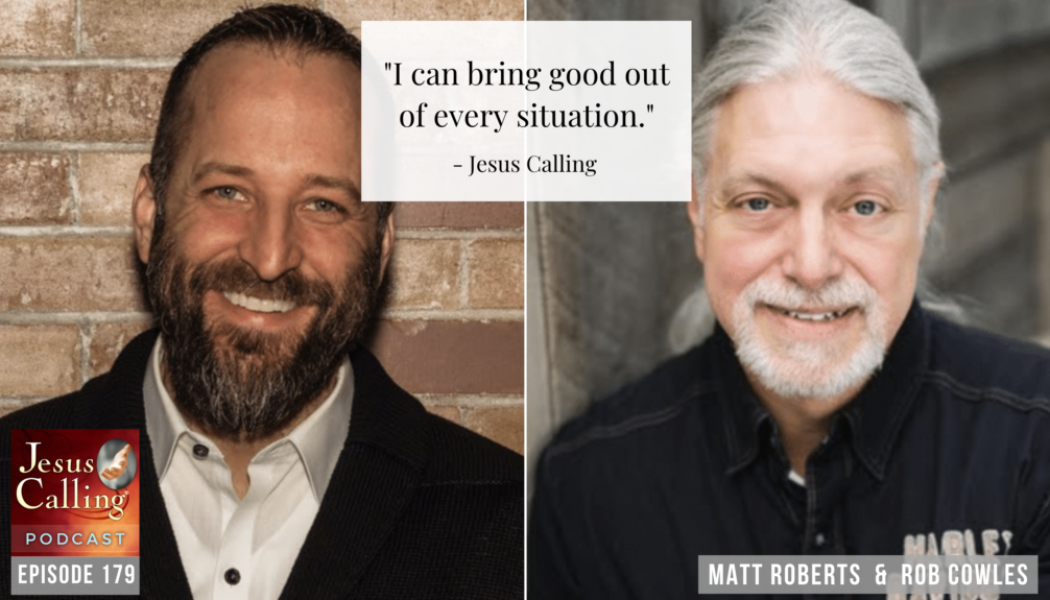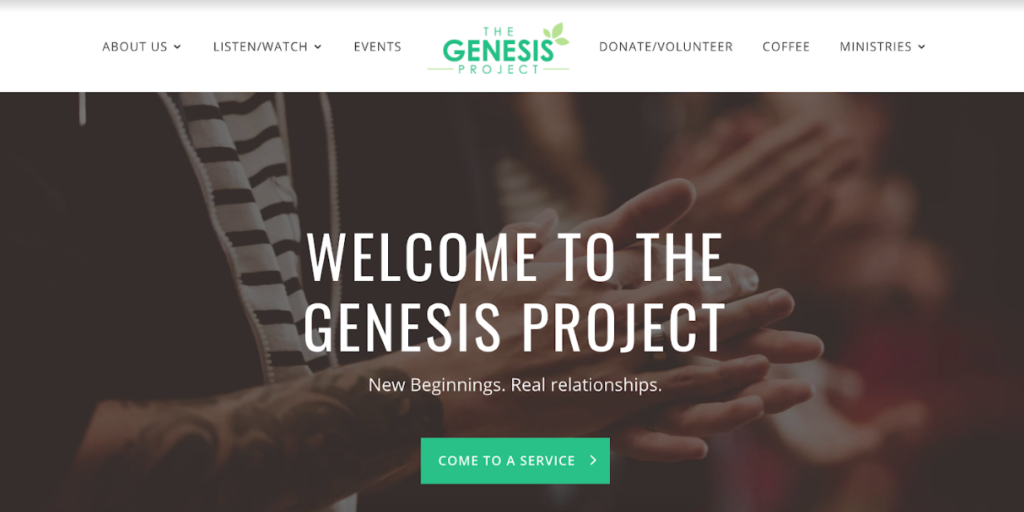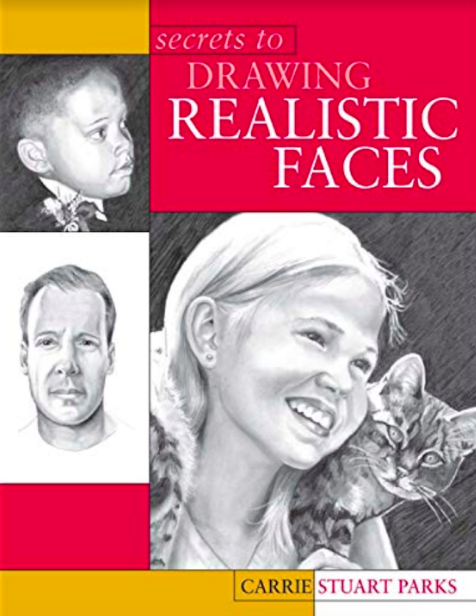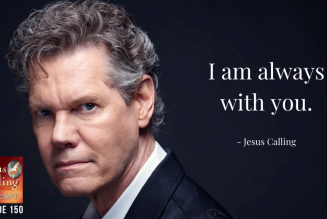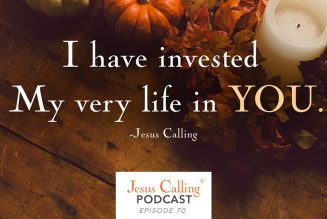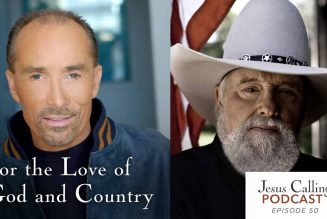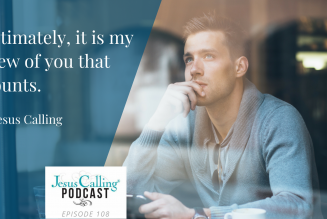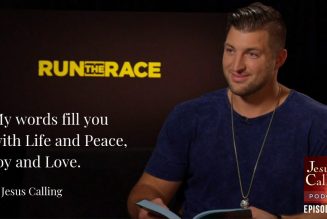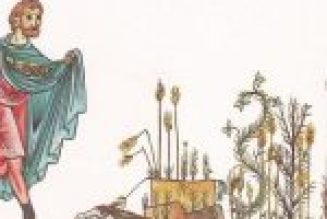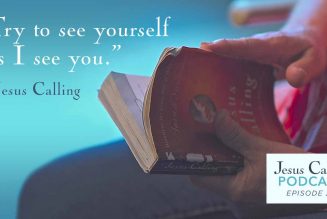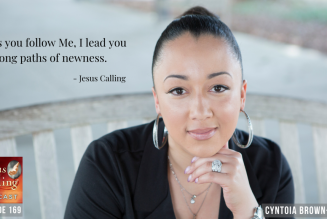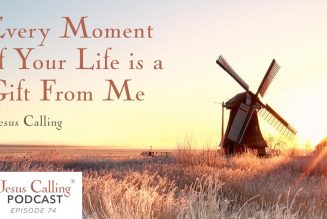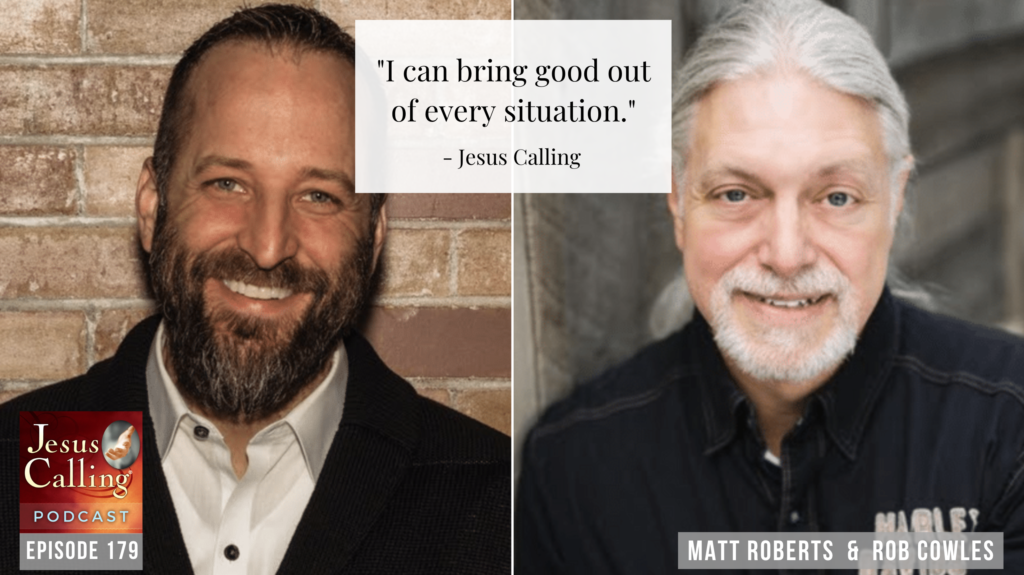
Matt Roberts: There are people we get the privilege to minister to, and to walk with, and live life with every day, who have been through things in life I never had to go through. And instead of seeing those things as a weakness, you begin to understand that they have a strength in their life that has never been asked of me. What we find is, when people actually engage in the story of somebody that God is actively redeeming, it changes everything.
Being Real When Life Isn’t Great: The Genesis Project & Carrie Stuart Parks – Episode #179
Narrator: Welcome to the Jesus Calling Podcast. Today we see how God is at work in some of the darkest places in our world, and that even in the most tragic situations, He can redeem those moments for good: pastors Rob Cowles and Matt Roberts, and forensic artist and author Carrie Stuart Parks.
First up, Matt Roberts and Rob Cowles are founding members of The Genesis Project, a network of believers who are working to reach people who don’t normally do church. Along the way, they’ve seen the beauty of forming authentic relationships with others, especially people who are different from us, and the power of telling your true story–flaws and all–to someone else—and still being loved.
Rob Cowles: My name is Rob Cowles. I am the founding and lead pastor of Genesis Project in Fort Collins.
Matt Roberts: My name is Matt Roberts. My wife, Candice, and I have been married for twenty years, and we planted and lead a church called The Genesis Project in Ogden, Utah. I’ve been doing that for the last ten years of my life.
When I was a young teenager, my dad was transferred for work. I lived in the southeast for my entire life, so [it was a] pretty big culture shock for us, going from a small, very tight-knit Pentecostal church environment in Atlanta, Georgia, and showing up to the west.
As a young teenager, my family began looking for a church. I’ll never forget showing up to the youth group on a Wednesday night and meeting Rob there. Our stories first intersected when I was just a young man, still trying to figure out who I am in Christ and my identity beyond my parents’ faith.
Bringing Church to People Who Don’t Do Church
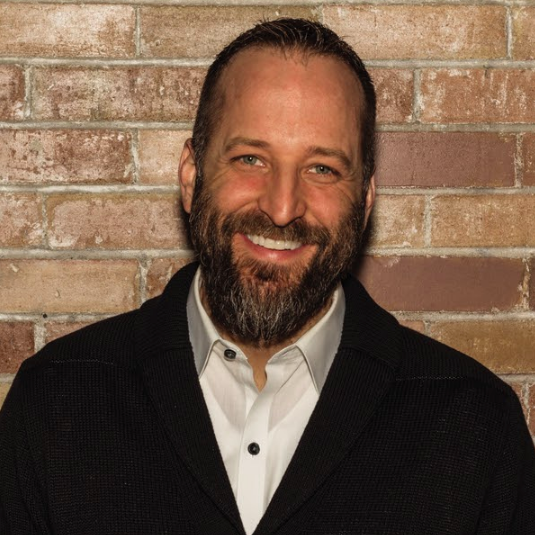
Matt Roberts: My story continued through Bible college. I went to Bible college in central Florida, at Southeastern University. Rob and I’s story parted for a few years. We would touch base over the phone every once in a while, but through that Bible college experience for me, God put on my heart this call to plan a church for people who don’t do church.
One of the things I realized was that all of my friends that I loved, the community that had been a part of my life, it was really hard to invite those people to go to church with me. It was just such a cultural gap: trying to explain what’s going to happen, and why we do the things we do, and pray the way we pray, and sing songs together. God began to birth in my heart [this idea of], “What would it mean to plant a church, to lead a church for people that was scrubbed of that culture of separation?”
“It was really hard to invite [my friends and community] to church with me. It was such a cultural gap . . . ” – Matt Roberts
That began the journey for Candice and I. We got married at the end of Bible College, in 1998, and began to go on a journey of really seeing that vision, a church for people who don’t do church, come to life. We were part of a church plant team at an inner city church in Portland, Oregon, so we moved all the way across the country in 1999. And for the next four and a half years, in Portland, we were youth pastors.
God opened our eyes there, to a world in need, to a lot of big city problems that, quite honestly, we had never been exposed to.I’d grown up very much middle class, everybody had food on the table and a roof over their head. We were never really exposed to poverty and needs until we were baptized into a community with a lot of needs, so that time in Portland was very monumental for us, really learning what it meant to be an embedded church in the middle of a culture that desperately needed a Savior.
“That time in Portland was very monumental for us, really learning what it meant to be an embedded church in the middle of a culture that desperately needed a Savior.” – Matt Roberts
We really felt God calling us to Utah, and we really left with no real plan, no funding, no church planning team. We just packed up two little boys, at the time, and moved from Denver in a U-Haul truck to Ogden, Utah, and began to pray about, What does this look like, to plan church for people who don’t do church?
We launched the Genesis Project, and have seen God do incredible things, and one of those incredible things was how God brought our story back into an intersection with Rob and Joy.
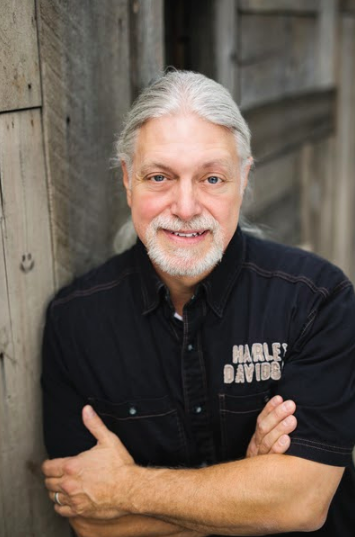
Rob Cowles: For me, the journey towards Genesis Project began when I went to a conference, a leadership conference, and I heard a man named Gary Haugen speak. Gary Haugen is the founder of International Justice Mission, and I’d never heard of him before. He was kind of this unassuming guy, but his whole talk was about living bravely in the way of Jesus, in the direction of Jesus, and how the church in America has settled into this Christian cul-de-sac, where we protect ourselves and we hide behind this fortress, thinking we’re making ourselves safe. But we don’t realize the apathy that it’s creating in our own lives. And he kept coming back to, “What does it mean to live bravely in the way of Jesus?”
“What does it mean to live bravely in the way of Jesus?” – Rob Cowles, on Gary Haugen
When the session was over, we went to break, but I just sat in a chair weeping, because God began to do something inside of me, and art of that was convincing me that I had become pretty safe. One of the things Gary Haugen said was, “Jesus didn’t come to make us safe. He came to make us dangerous.”
I remember writing, just a few months later, in a journal, at the top of the page: “What does it mean to live bravely in the way of Jesus?” And it would take a few years to answer that question for me. One of the answers to that question came when I had some meetings to go to Salt Lake City, Utah. I called Matt, because I hadn’t talked to him in years, and I knew I was going to be close. I asked him if I could drive up from Salt Lake and take him to lunch, just to catch up. [I told him] I’d love to hear about his church. And he said, “Sure, but if you’re going to be here anyway, why don’t you stay over the weekend and speak at our church?”
So I went to Utah, went up to meet Matt, and there were two things about that experience, speaking at Genesis Project in Ogden, that really rocked me. The first one was when I walked into the building, from the very beginning, I started meeting people for the first time who shared their story so freely. They were just so open about talking about their brokenness. I mean, literally, people would come up and say, “Hey, my name’s Rob. I used to be a meth addict, and then I came here and I encountered…” and they would go into this story, sharing these deeply personal things, which was a very different church culture than anything I’d ever experienced before.
I grew up in a church culture where, whether intentionally or not, it fostered a mentality that, Everything’s fine. It doesn’t matter if you had a major fight before you walked in the building. When you come to church, everything’s good. Everything’s fine. You don’t talk about your brokenness here. I was experiencing all these people who so freely talked about their brokenness, and what God had done in their lives.
And then when the service began, the worship just brought me to tears. It wasn’t because of how great the band was, though they’re very talented. It was the raw authenticity of worship, because you knew you were in a room filled with people who had come from the depths of darkness, and been brought into light. They couldn’t not worship. I mean, there was an authenticity about their worship [at The Genesis Project], because they really knew what it was to be brought back from darkness, brought back from death into new life.
“There was an authenticity about their worship [at The Genesis Project], because they really knew what it was to be brought back from darkness, brought back from death into new life.” – Rob Cowles
I had a great weekend there, and a wonderful experience. When I came home, I remember telling my wife about that experience, and I couldn’t tell it without crying. For about two months, every time I would talk about that church, I would start to cry. And eventually, I remember telling my wife, “I need to be part of something that I can’t talk about without crying.”
It brought me back to why I said yes, thirty-one years ago. To be a pastor was to serve the most broken, most hurting people in our community. For me, that began this holy discontent in my life, that would eventually lead to us planting a Genesis Project in the city of Fort Collins.
Cultivating an Open, Honest Community
Matt Roberts: I actually paid my way through Bible college by working as a bartender in Orlando, Florida. One of the things I realized is some of the most real, vulnerable, authentic conversations that I’ve ever experienced in my life were in that culture, standing on the other side of a bar. When we actually planted The Genesis Project, we would joke around and say that our mission statement could be summed up in the theme song to the eighties sitcom Cheers, that says something like, “Sometimes you wanna go where everybody knows your name, and your worries are all the same.”
Man, that was a really big piece of what we wanted to create. We talked a lot about cultivating community, and what we realized is that the community doesn’t happen by accident. We have to actually cultivate and create a space where people can come in and be real, be open, and be honest. We realized through that process that there’s a lot of church people who are really, really uncomfortable with a very honest, open community because when everybody else is being honest, it fights against my sensibilities that church is a place where I pretend and put on that mask, put my best foot forward.
“Community doesn’t happen by accident. We have to actually cultivate and create a space where people can come in and be real, be open, and be honest.” – Matt Roberts
And one of the things we all have in common at Genesis Project Campuses is a coffee shop. One of the things that we teach our baristas at our coffee shops at the Genesis Project is that your role is to be a church bartender. Your role is to be able to dive into relationships and begin open, raw, honest conversations with people, because story is the beginning of safe community.
Rob Cowles: Yeah, that’s good. You know, I think I remember the day that my oldest son told me, “The thing that the church taught me was how to be a hypocrite.” And the words really stung, because it was a realization, even in my own life, that I had been a part of a church culture. I don’t think churches intentionally do this, but I think what happens is if you create a culture where it’s not safe to talk about your brokenness, to talk about your failure, to talk about your pain, that then you naturally create a culture where you have to be fake.
“What happens is if you create a culture where it’s not safe to talk about your brokenness, to talk about your failure, to talk about your pain, that then you naturally create a culture where you have to be fake.” – Rob Cowles
One of the things we talk about often—Matt and I have talked about it in both of our churches, and I think it’s probably true in all of our Genesis Project churches—is when people come from really broken places, whether they’re homeless or battling an addiction or whatever the past has been, and especially when they’ve been wounded by the church, and they come and they start connecting with people—we hear it over and over again—people will say, “This just feels like home to me. This feels like home.” A lot of them have never known a home feeling, even in their biological family, and I think that comes when you value that authenticity. You respect the story that people have, that it’s their story. The good, the bad, and the ugly. And you love them and meet them where they are and begin a journey with them.
Matt Roberts: When we first sat down, which was a few years ago now in this process, God had given us opportunities to plant other Genesis Project churches, and we really felt like sharing our story. We have the privilege, at our churches, of sharing the gospel in what we would contend is a post-Christian world in America, with people that are hearing the true gospel for the very first time.
How beautiful of a thing it is for somebody to hear the true gospel—not a works-based gospel that they’ve heard somewhere, not a gospel that is quantified by how much you can give or how much you can offer, but a gospel for this spiritually bankrupt individual that has nothing left to offer, yet God still loves you and offers you everything. It is so simple, but it is so transformative. What we see over and over and over again is it still works, that people still flock to and respond to the person of Jesus Christ. We have the privilege to be able to share Him in a fresh and new way in our community, and that’s the story we want to tell.
God’s Love Isn’t Dependent on What We Can Offer
Rob Cowles: I think I first learned about Jesus Calling because of my social network feed. I kept seeing quotes pop up and it raised a curiosity, and I picked up the book.
Matt Roberts: We have so many people at our church that have actually passed copies of the book to me like, “Man, you have to read this.” And I think that the simplicity and depth of the book is something that really resounds with our churches and with people who come in that are fostering a new and fresh relationship with Jesus in their lives.
The one on April 19th is one that really spoke to me, and I think captures the heart of who we are and what we try to do in our communities.
I love you regardless of how well you are performing. Sometimes you feel uneasy, wondering if you are doing enough to be worthy of My Love. No matter how exemplary your behavior, the answer to that question will always be no. Your performance and My Love are totally different issues, which you need to sort out. I love you with an everlasting Love that flows out from eternity without limits or conditions. I have clothed you in My robe of righteousness, and this is an eternal transaction: Nothing and no one can reverse it. Therefore, your accomplishment as a Christian has no bearing on My Love for you. Even your ability to assess how well you are doing on a given day is flawed. Your limited human perspective and the condition of your body, with its mercurial variations, distort your evaluations. Bring your performance anxiety to Me, and receive in its place My unfailing Love. Try to stay conscious of My loving Presence with you in all that you do, and I will direct your steps.
I love the first line. I love you regardless of how well you are performing.
I think there is a brand of religion that is so predominant in our world today, that tells a story of a God who loves us based on what we offer, based on what we bring to the table, based on how well we’re doing. But the gospel is a gospel for bankrupt people, and it’s a gospel for the poor in spirit. It’s the gospel for those who have nothing to give and nothing to offer.
A lot of people have been convinced that they have messed up their lives so thoroughly that God could never love them, that God could never forgive them, that maybe they’ve wasted too much time and done too many wrong things, that the bad side of a scale is just too heavy and too full to ever do enough good to counterbalance it. And the gospel is just that. It has nothing to do with us, it has nothing to do with our performance. It has nothing to do with what we bring to the table. It begins with a God who gave everything, when we had nothing to offer in return. I think there’s such a beauty and freedom that we find in that gospel, when we step away and realize that God loves us because we are His. He loves us because we belong to Him.
And man, there’s hope in that gospel, right? There’s so little hope left for somebody who has made one bad decision after another, who life has caught up to them and they have found themselves in a pit that is too deep to get themselves out of. A workspace religion leaves people like that, leaves people like you and I feeling like we can never compensate and never make up for the darkness and the evil that exists in our life. But the gospel tells a very different story: “My love for you is not dependent on what you have to offer me.” And man, what a great gospel to reclaim in our world and our generation. 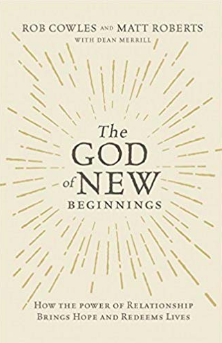
Rob Cowles: Yeah.
Matt Roberts: There’s something powerful that happens when you can show up to a place and have no more secrets and know that you’re still loved. That’s the power of story and of authenticity.
Narrator: You can find Matt and Rob’s book, The God of New Beginnings at your favorite book retailer today.
Stay tuned to hear from forensic artist and thriller author Carrie Stuart Parks after a brief message about a beautiful edition of Jesus Calling that will help you start your daily devotions in the new year in a fresh way.
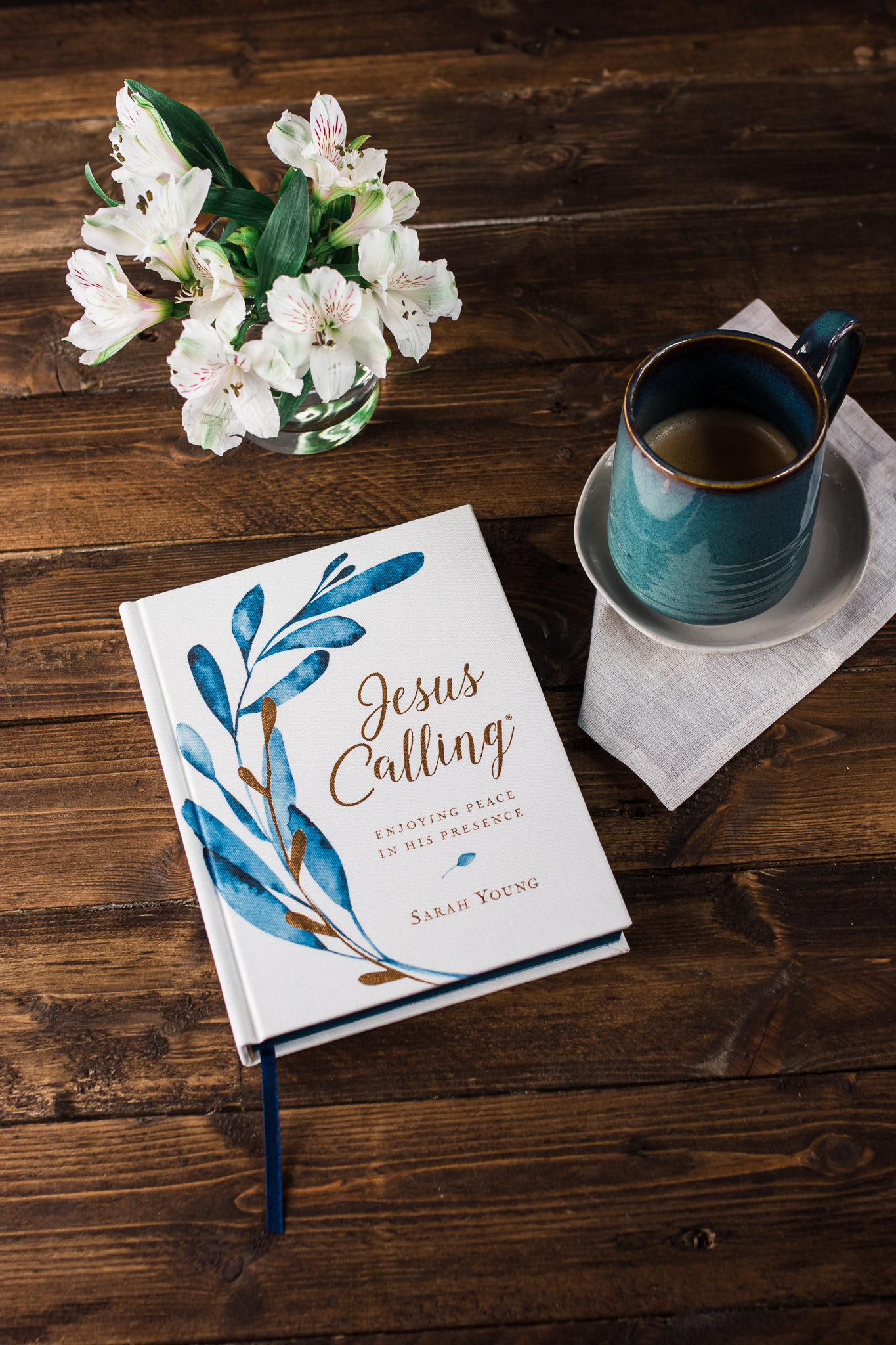 Narrator: Are you looking to introduce a friend or loved one to the peace that can be found by spending time with God daily? There’s a beautiful new edition of Jesus Calling that makes a gorgeous gift for someone who might be seeking a new perspective for a new year. It’s the same Jesus Calling daily devotional that has inspired over 30 million readers, now updated with a lovely fabric cover and eye-catching foil with feminine floral touches. This elegant new version also features large text and written-out scripture verses with each passage.
Narrator: Are you looking to introduce a friend or loved one to the peace that can be found by spending time with God daily? There’s a beautiful new edition of Jesus Calling that makes a gorgeous gift for someone who might be seeking a new perspective for a new year. It’s the same Jesus Calling daily devotional that has inspired over 30 million readers, now updated with a lovely fabric cover and eye-catching foil with feminine floral touches. This elegant new version also features large text and written-out scripture verses with each passage.
For more information about this stunning new edition of Jesus Calling, visit JesusCalling.com/Botanical. That’s JesusCalling.com/botanical. Now, let’s get back to the second half of our program.
Narrator: Carrie Stuart Parks is a forensic artist who talks with people who have been through some of the most harrowing experiences. With warmth and care, she tries to help them close a chapter on that dark moment so they can reach toward the future with hope. Carrie tells us how she found her way into this fascinating career, and how she’s reaching others through her second career as a novelist.
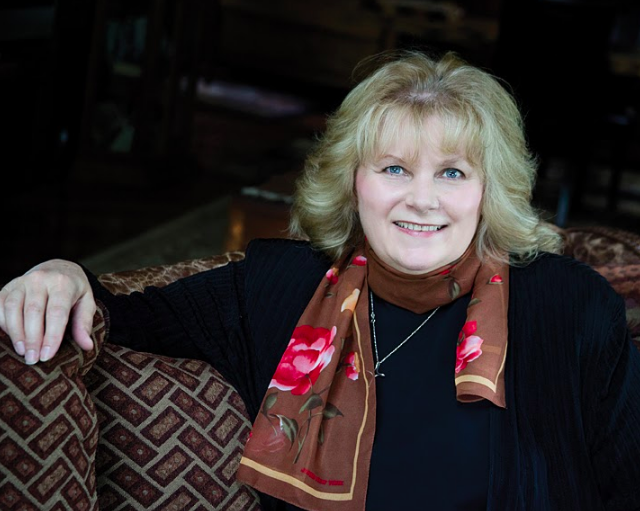
Carrie Stuart Parks: Hi, I’m Carrie Stuart Parks. I am a full- time forensic artist and a law enforcement instructor. I live in the mountains of North Idaho, on the same 685-acre ranch that I grew up on. I live there with my husband, six dogs, and I am not sure how many cats. I think somewhere around eighteen, just because they’re feral and they’re all the same color. So the only way I know how many cats I have is if I feed them and count. *laughs*
My mom and dad were professional people. Dad was the director of the School of Law Enforcement at North Idaho College, and my mom was a high school guidance counselor, so they were teachers. They had summers off, and Idaho, where I live in the mountains, near Coeur d’Alene, is just beautiful. Everything is clean and the air is fresh. it was a wonderful life, except for the chickens. I wasn’t really crazy about chickens, but otherwise, I had a great life growing up.
Walking the Winding Road to Forensic Art
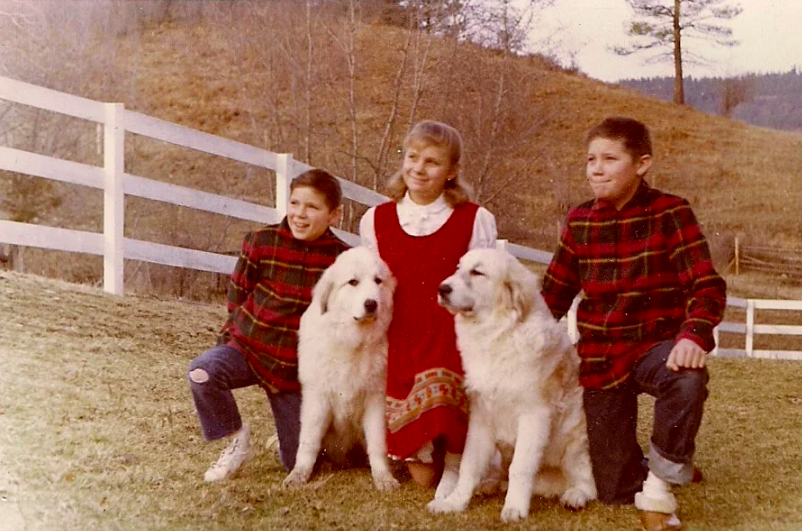
After high school, I decided I really hated school. But my parents, both having master’s degrees, would not hear of my idea of just kind of hanging out the rest of my life. They felt that I needed to have a purpose of some kind, so they insisted on college. I thought, Well, what kind of college degree can I get that doesn’t take a lot of tests and not a lot of studying? And that was art.
After four years of college, and four different colleges, I still didn’t know what I wanted to be. So I went to work for different veterinarians because growing up with animals, you know how to take care of them. I did that, and while I was doing that, my dad, who, as I mentioned, was the director of the School of Law Enforcement, asked me if I would use my artistic talents to help on the crime scenes.
We would do everything from the crime scene to accident reconstruction, ballistics, paint tool mark striations, and questions of altered documents. And all of the different things that we did in this strange new field called forensics, which nobody had heard of, had to be prepared for court. So my initial duties were to hold the stupid end of the tape measure and help measure crime scenes and prepare courtroom trial charts.
In 1985, I was invited to go back to the FBI Academy in Quantico, Virginia, to learn about being a composite artist, which I found fascinating, because here was everything I liked to do. The people I met were wonderful, and one that I met, I eventually fell in love with and married. So I found romance in the echoing halls of the gerbil trail of the FBI Academy in Quantico. When I came back to Idaho, I was the first forensic artist in the Northwest, [the first] trained forensic artist in the northwest.
After a few years, some of the officers came to me and they said, “We want to do what you do. We want to learn how to be a forensic artist.” And I thought, Gosh, if you do what I do, then I won’t do what I do, because you’re doing what I’m doing. So I don’t know if I want to have you do what I do. But I thought about it, and I thought, Well, maybe I do love to teach. Maybe I would be more effective in teaching them how to be forensic artists. So in 1988, I started teaching forensic art, and eventually, my husband, the fellow I met at the FBI Academy, joined me, and we became the largest instructors of forensic art in the world. We teach more classes to more agencies in more locations than every other school combined.
The very first class that I taught in forensic art, one of my students had a case where a twelve-year-old girl was assaulted and murdered, and the only evidence they had on her was a single hair. They knew if they could use this new-fangled thing called DNA, they might be able to link someone to that hair, but they first had to have a lead, so my student volunteered, or they asked him if he would do a composite sketch. And he said yes. Then, they put an ad in the paper saying, “Was anybody in the area that saw anything at this particular time? Would you please come forward? We need to look [into] this case.” A fellow came forward and he said, “Well, I was bicycling through when I saw this man come out of the bushes.”
Now, it’s been close to a week, it’s been three, four days since he saw the man and he was bicycling. It was a very, very brief glance, but the man was able to do a composite sketch with my student. That composite sketch led them to the identity of Jonathan Gentry, which eventually became the first DNA conviction in the state of Washington, and it was all because of a composite sketch. So my very first class showed me the value of what I was doing, there’s that blessing, and how it all was going to fit in the grand scheme of things.
Giving Hope to People in Their Darkest Moments
I am extremely blessed in that my dealings are primarily with the victims or witnesses, so I’m dealing with the after-effects in most cases. From that standpoint, I don’t have as many, shall we say, nightmares, in the sense that I feel my presence being there. I pray for my victims or witnesses. I pray that I will be salt and light to them as I speak to them. I wear a cross, I let them know, just by having that cross on the outside, where I’m coming from. I don’t say anything to them. I just let the presence of that and my words be, hopefully, helpful.
“I pray that I will be salt and light to them as I speak to them. I wear a cross, I let them know, just by having that cross on the outside, where I’m coming from. I don’t say anything to them. I just let the presence of that and my words be, hopefully, helpful.” – Carrie Stuart Parks
My goal here is to produce a drawing that leads to the identity of the person, but if in the course of our interview, in the course of working it out, they can feel like they put this out and they’re leaving some behind with me—I have had victims or witnesses actually hug me when they were all done, or they asked me for a hug, which tells me that that they did feel what I wanted them to feel.
Finding a Second Career: Writing Thriller Novels
I started writing. Well, actually, I had written five books on drawing and watercolor. They were all called Secrets to Drawing Realistic Faces and so on. Christmas came, and I have a girlfriend that I would shop for year-round. It sounds like I’m shopping constantly, but she was very well off, so she didn’t need anything, so I try to find the one thing that would be kind of fun.
Well, this Christmas was coming around, and I had nothing, absolutely nothing, to give her. So I thought, I’ll just write a little story, kind of an adventure story about this fat lady and her skinny, beautiful friend, which is basically us. And it was an adventure, they would go off and they did this, that, or the other, and it was funny, and it was fun. For me, it was hugely long. It was a whole hundred pages long, so it was just this massive manuscript. I gave her that for Christmas.
Well, she started reading the book, this whole story, out loud to her husband at night. [Actually, she} started off by just reading it and laughing, and he finally said, “Well, what are you laughing at?” And she’d read what I had written aloud. He listened for a while, and then he called me up and he said, “Can I come over some time?” And I said, “Sure.” He came over, and he said, “Given what you gave my wife, I think that you have some writing talent. I would like to teach you how to write.”
The wife was Barbara Peretti and her husband was Frank Peretti, and Frank Peretti, in 2004, offered to mentor me in how to write. I was the first person he had ever mentored. For the next eight years, I would come over twice a week with all of my bad writing, the mess that I’d made the day before, and I would bring a copy of what I’d written for him and a copy for me. We would go through it, I would read it out loud, and he would say, “No, no, this is how you do it. Oh, yeah. That was pretty good. No, you can’t do it like that.” In his own words, he said, “I’m going to teach you how to fish.” So he taught me how to write, and he had faith that I would learn how to do this.
This was so much of God’s work, because within six weeks of his offering to teach me to write, I was diagnosed with stage two breast cancer, so while I was learning to write and writing, which I could do at home, I was going through surgeries and chemo and my mother was dying of emphysema, so I was taking care of her. It was really a blessing to have this to do, rather than other things. I could really keep busy.
A lot of people think a Christian book is some kind of [thing like] everybody’s running through the house, chasing each other with knives and guns, and all of a sudden, Jesus steps in and says, “Stop it, you guys, be saved.” It isn’t like that. And I don’t write my stories from the standpoint of, “This is going to be a Bible story.” It’s going to be a real story. Most of them are based on my cases, and it also designed that I want Christians to be comfortable and enjoy reading it.
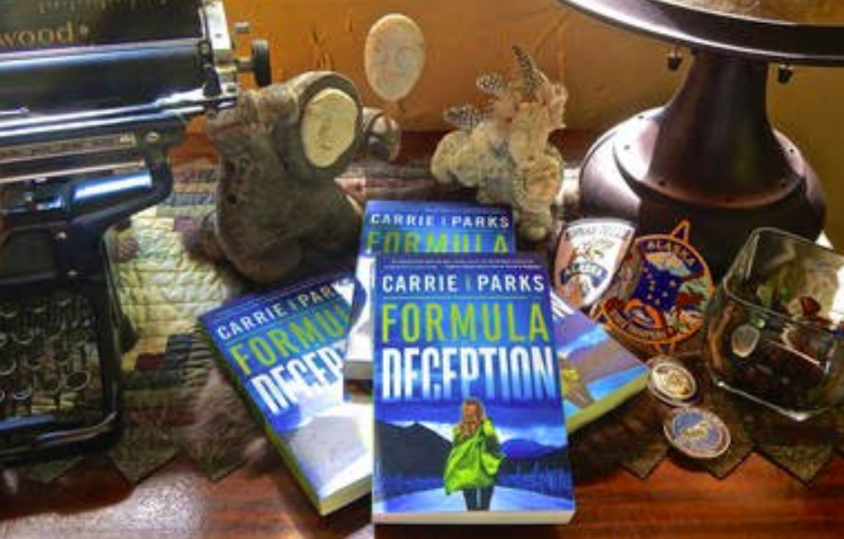
For more than twenty years of my life, I was a Unitarian Universalist, and when I finally came back to being a Christian, I had an awful lot of catching up to do, so I write for people like me. I write for people that would think like I thought when I was a Unitarian. I would want them to say, “Gee, that’s interesting. Maybe I should look into this a little more.” I’m not preaching to the choir here. I’m trying to reach the world for Christ, but not by pounding them over the head with the Bible, [rather] with something that they could believe in and understand and relate to.
“When I finally came back to being a Christian, I had an awful lot of catching up to do, so I write for people like me…I’m trying to reach the world for Christ, but not by pounding them over the head with the Bible, [rather] with something that they could believe in and understand and relate to.” – Carrie Stuart Parks
“Trust Me one day at a time.”
My publisher is HarperCollins Christian. This last year, they had a get together, and they handed me this cute little padded book called Jesus Calling. And they said, “Here, you read this.” My husband was there, so he got one, too. We each got a book, and I started reading. I thought, Wow, this is fascinating. I read it as a little extra boost, if you will, because it’s written so positively.
I ended up giving my book to a lady who was just looking into Christianity, and I said, “I have it with me.” I was traveling with it, because it’s small and fits in my purse. And I gave it to her, and I thought, Well, maybe if it’s blessing me, maybe it’ll bless her.
The passage that I love, that really reached out and touched me, came from March 18th. What I liked about it is the last line is from Matthew 6:34, and that’s what my mom used to say to me all the time, but I didn’t know it was [from] a Bible of hers. She would say to me, sufficient under the day is the evil therein. And I’d look at her like, “What would you just say?” Sufficient unto the day is the evil, I think, is the evil thereof. What she would then say was, “Just take one day at a time. Just today is enough for today.”
On March 18th, it says:
Trust Me one day at a time. This keeps you close to Me, responsive to My will. Trust is not a natural response, especially for those who have been deeply wounded. My Spirit within you is your resident Tutor, helping you in this supernatural endeavor. Yield to His gentle touch; be sensitive to His prompting. Exert your will to trust Me in all circumstances. Don’t let your need to understand distract you from My Presence. I will equip you to get through this day victoriously as you live in deep dependence on Me. Tomorrow is busy worrying about itself; don’t get tangled up in its worry-webs. Trust Me one day at a time.
That just reaches me so much, because in this strange lifestyle that I have, I too, have to take each day as it comes. One day at a time. Sufficient under the day of the problems that are there. Don’t borrow trouble. Don’t worry about, Okay, well, what if? What if, what if? What if? That’s what got me through cancer, my mom, and everything else that God had a purpose. God had a reason. And I trust in him one day at a time.
Narrator: To learn more about Carrie’s books, please visit her website at carriestuartparks.com.
If you’d like to hear more stories about finding God in the dark places, check out our interview with for KING & COUNTRY’s Joel & Luke Smallbone.
Narrator: Next time on the Jesus Calling Podcast, we speak with world champion athlete and Olympian Lolo Jones. Lolo is one of only ten athletes in history to compete in both the Summer and Winter Olympic games. And through it all, Lolo has her eyes on the true prize.
Lolo Jones: For God to show me that I can have peace in a storm is much more powerful to me than the gold medal that’s going to sit in my sock drawer.
Narrator: Do you love hearing these stories of faith weekly from people like you whose lives have been changed by a closer walk with God? Then be sure to subscribe to the Jesus Calling: Stories of Faith Podcast on Apple Podcasts, Stitcher, or wherever you listen to your podcasts. If you like what you’re hearing, leave us a review so that we can reach others with these inspirational stories. And, you can also see these interviews on video as part of our original web series with a new interview premiering every other Sunday on Facebook Live. Find previously broadcasted interviews on our Youtube channel, on IGTV, or on jesuscalling.com/media/video.
